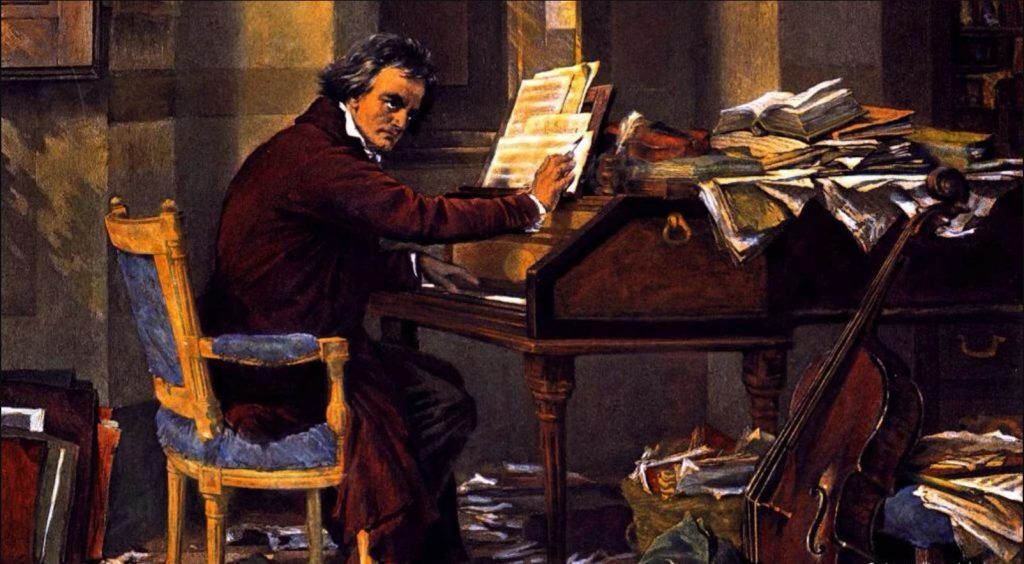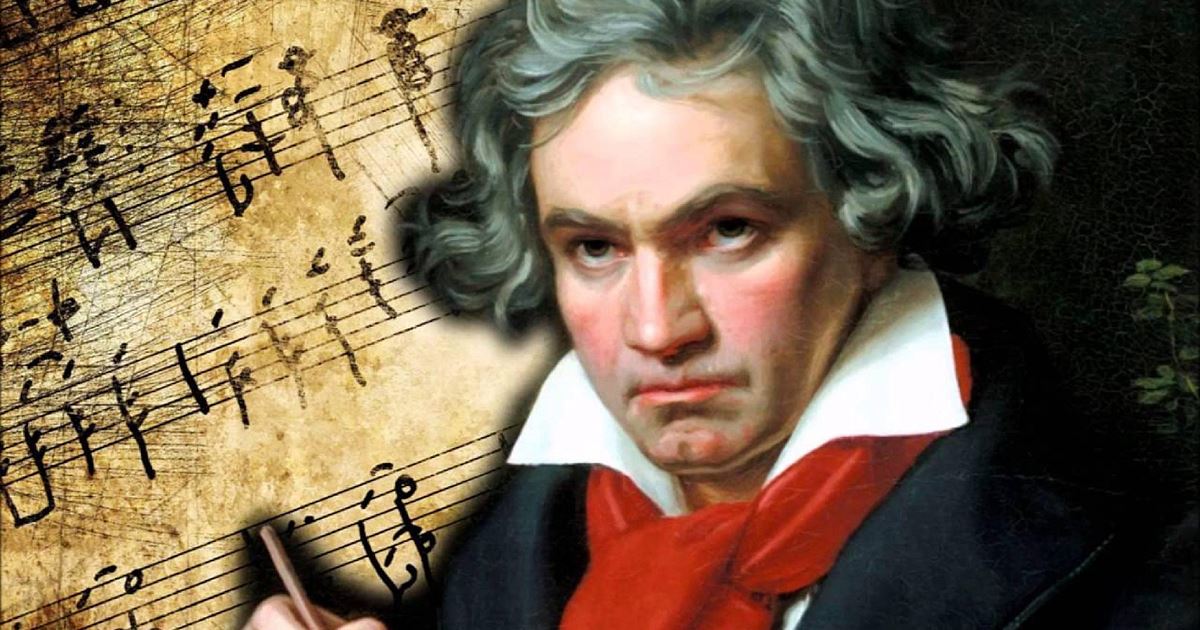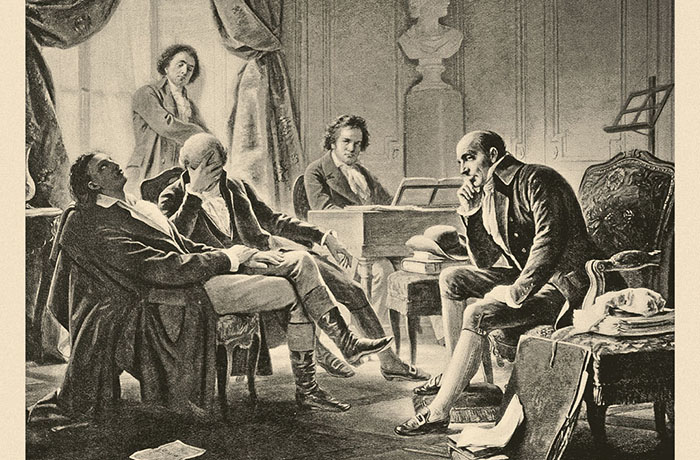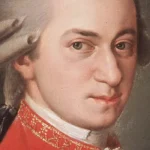Ludwig van Beethoven (1770-1827) is not merely a name in the annals of classical music; he symbolizes a transformative force that reshaped the landscape of musical composition. His life story is intertwined with profound personal struggles and extraordinary artistic triumphs, creating a timeless narrative that resonates across centuries. Beethoven’s journey through sound and silence, as he grappled with deafness, stands as a testament to his insatiable creativity and revolutionary spirit. This article will delve into various facets of Beethoven’s life and work, exploring his role as a bridge between musical eras, the emotional depth of his compositions, and his enduring cultural impact.
Bridging Eras: Classical to Romantic
Ludwig van Beethoven’s contributions to music mark a pivotal transition between the Classical and Romantic eras. While his predecessors, such as Mozart and Haydn, focused on structured forms and elegant melodies, Beethoven pushed the boundaries of these conventions, infusing his compositions with emotional complexity and depth.
Harmonizing Tradition and Emotion
At the heart of Beethoven’s genius lies his ability to marry traditional musical forms with intense emotional expression. The Classical era emphasized clarity, balance, and formality, resulting in refined compositions that adhered to established conventions. In contrast, Beethoven recognized that music could transcend mere structure, allowing composers to explore the depths of human emotion.
His early works reflect the influence of Classical masters, yet they also hint at the burgeoning Romantic spirit. For instance, in his Symphony No. 3, known as the “Eroica,” Beethoven departed from the conventional four-movement format, infusing the work with a sense of heroism and struggle. The symphony opens with bold motifs that capture the listener’s attention, evoking feelings of grandeur and determination.
These emotional undertones resonate profoundly with audiences, inviting them to connect with the music on a personal level. Beethoven’s ability to convey feelings of longing, defiance, and triumph continues to captivate listeners, bridging generational gaps and fostering a shared appreciation for the human experience.
Redefining the Role of the Composer
As Beethoven’s compositions evolved, so too did the perception of the composer’s role in society. No longer were composers relegated to mere craftsmen churning out works for aristocratic patrons; instead, Beethoven emerged as a visionary artist who sought to communicate profound truths about the human condition.
His explorations of individuality and freedom align closely with the ideals of the Enlightenment, a period characterized by philosophical thought emphasizing reason and autonomy. Through his music, Beethoven challenged societal norms and conveyed messages of liberation and self-discovery. His compositions encouraged listeners to reflect on their own lives, inspiring a sense of agency and empowerment.
Furthermore, Beethoven’s later works delve deep into the intricacies of human emotion, navigating themes of love, loss, and existential contemplation. In his final piano sonatas, one can discern a palpable sense of introspection and vulnerability, as if he were grappling with his mortality and leaving behind a legacy that resonates far beyond his time.
A New Language of Expression
Beethoven’s innovations extended beyond thematic exploration; he revolutionized the language of music itself. His pioneering use of dynamics, harmony, and form introduced new possibilities for expression. The dramatic contrasts between loud and soft passages, along with unexpected shifts in tonality, became hallmarks of his style, inviting listeners to engage with the music in fresh and compelling ways.
One need only listen to the “Moonlight Sonata” to grasp the emotional weight embedded within its delicate arpeggios and haunting melody. The piece encapsulates a sense of yearning and introspection, drawing listeners into a contemplative state. Through his innovative techniques, Beethoven transformed the very fabric of musical language, laying the groundwork for future composers who sought to articulate their own emotional journeys.
In reexamining Beethoven’s role as a bridge between the Classical and Romantic eras, we find a figure whose contributions extend far beyond mere notes on a page. His ability to merge tradition with innovation, individuality with collective experience, renders him a timeless icon of artistic expression. As we engage with his music, we are invited to explore our own emotions, provoking thought about the complexities of life and the myriad ways in which music can serve as a vessel for understanding.
A Journey Through Sound and Silence
Beethoven’s life can be characterized as an odyssey—a remarkable exploration marked by both struggle and achievement. His battle with hearing loss began in his late twenties, presenting a daunting challenge for an artist whose primary medium was sound. While many might have succumbed to despair, Beethoven chose to channel this adversity into a wellspring of inspiration, leading to some of the most innovative works in Western music.
Embracing Adversity: The Descent into Silence

Beethoven’s journey reveals a profound irony: as his hearing deteriorated and he became increasingly isolated from the world of sound, he paradoxically expanded the horizons of auditory imagination. Instead of retreating into silence, he ventured deeper into his internal landscape, using a pencil to sketch musical ideas on paper and relying on vibrations and inner hearing to guide him. This radical transformation of his creative process resulted in groundbreaking compositions, such as the Ninth Symphony, which pushed musical boundaries and explored timeless themes of joy and unity. His ability to compose intricate works despite his deafness challenges our understanding of artistic expression, raising questions about whether true creativity depends on external stimuli or can emerge entirely from within.
In the late period of his life, often regarded as the pinnacle of his artistic achievements, Beethoven defied norms and expectations by experimenting with unconventional forms and structures. Works like the Piano Sonata No. 32 exemplify this departure from tradition, blending introspection with innovation. In these compositions, quiet moments hold as much power as climactic passages, suggesting that silence itself can carry profound significance. Beethoven’s journey not only redefined the limits of artistic expression but also serves as a testament to the indomitable spirit that drives human creativity, showing that great art can resonate deeply even in the face of profound limitations.
Breaking Barriers: Innovation and Ingenuity
As Beethoven transitioned from the Classical to the Romantic era, he became increasingly aware of the potential for music to express a wide array of emotions. He infused traditional forms with unprecedented emotional depth, reflecting the complexities of the human experience. His ability to convey struggle, triumph, and introspection laid the groundwork for future generations of composers who sought to explore similar themes.
The late string quartets, composed during his final years, serve as a prime example of Beethoven’s innovation. These pieces showcase not only technical mastery but also an intimate dialogue among instruments, revealing a new dimension of communication in music. The interplay between voices creates tension and release, mirroring the ebb and flow of human emotion.
Moreover, the harmonic language employed in these works transcends mere entertainment; it speaks to the core of our existence. As listeners engage with the rich textures and intricate nuances, they are invited into a shared space of reflection and connection. Beethoven’s genius lies in his ability to transform personal struggles into universal themes, inviting audiences to participate in a collective exploration of life’s challenges and victories.
Cultural Impact and Legacy

The cultural implications of Beethoven’s work extend far beyond the concert hall; his compositions resonate deeply within the collective consciousness. Music has the power to evoke emotions and provoke thought about the human condition, and Beethoven’s works exemplify this capacity in profound ways.
A Universal Anthem: Ode to Joy
Perhaps the most iconic manifestation of Beethoven’s cultural impact is the “Ode to Joy,” a choral finale from his Ninth Symphony. Originally conceived as a celebration of brotherhood and unity, this piece has transcended its origins to become a universal anthem for hope and solidarity.
The text, adapted from Friedrich Schiller’s poem “An die Freude,” conveys a vision of humanity united in joy. Throughout history, the “Ode to Joy” has been repurposed for various social movements and occasions, embodying a collective aspiration for peace and understanding. Its melodic simplicity, coupled with profound thematic depth, makes it accessible to diverse audiences, serving as a reminder of the potential for harmony amidst discord.
Beyond its musical brilliance, the “Ode to Joy” acts as a powerful vehicle for social change. It has been performed at significant historical moments, including the fall of the Berlin Wall and various international gatherings advocating for unity and justice. Beethoven’s ability to articulate complex emotions resonates with listeners from different walks of life, urging them to reflect on their shared humanity.
Dialogue Between Individual and Collective Experience
Beethoven’s compositions often mirror the struggles and triumphs of the individual, creating a dialogue between personal experience and collective identity. His music serves as a conduit through which listeners are invited to explore their own emotions while connecting with broader societal narratives.
Take, for example, the “Piano Concerto No. 5,” commonly known as the “Emperor Concerto.” This majestic work captures the essence of nobility and resilience amid challenges. The opening movement exudes a sense of grandeur, inviting listeners to reflect on their aspirations and struggles as they navigate life’s complexities.
In a world often rife with division and turmoil, Beethoven’s compositions offer solace and introspection. They encourage individuals to confront their own vulnerabilities while simultaneously recognizing their place within a larger community. This duality—where personal experiences intersect with universal themes—imbues Beethoven’s music with a timeless relevance that resonates across generations.
Educating Future Generations
The educational perspective on Beethoven’s life and works remains vital, transcending technical mastery to encompass historical context and societal influences. Understanding Beethoven’s evolution as a composer provides valuable insights into broader changes occurring during his lifetime, particularly during the Enlightenment.
Many academic programs emphasize the importance of contextualizing Beethoven’s innovations within the socio-political landscape of the late 18th and early 19th centuries. By examining his music alongside historical events, students gain a deeper appreciation for how artists respond to their environments and challenges.
Moreover, exploring Beethoven’s contributions to music theory and composition techniques equips future musicians with the tools necessary to navigate the complexities of their own artistic journeys. His legacy inspires budding composers to embrace innovation and challenge conventions while remaining attuned to the emotional depths underlying their creative endeavors.
Engaging with Beethoven’s music in educational contexts fosters meaningful conversations about artistry, resilience, and the human experience. Students are encouraged to reflect on their own lives and the role of creativity in shaping their identities, thus perpetuating Beethoven’s enduring influence.
Conclusion

In summary, Ludwig van Beethoven emerges as a monumental figure whose contributions to classical music transcend the confines of time and convention. As a bridge between the Classical and Romantic eras, he redefined the role of the composer, merging tradition with emotional depth, and inviting listeners to engage with music on a deeply personal level. His extraordinary life story exemplifies the resilience of the human spirit, demonstrating how adversity can fuel artistic innovation.
The cultural impact of Beethoven’s work is immeasurable. His compositions not only inspire hope and foster connection but also provoke reflection on the human condition. Through his music, he left a legacy that continues to remind us of the transformative power of art—one that unites us in our shared humanity and affirms the boundless potential for expression woven into the fabric of our lives.
✉️ Stay Connected — Subscribe for Weekly Updates
Discover timeless stories, practical wisdom, and beautiful culture — delivered straight to your inbox.
*We only share valuable insights — no spam, ever.






